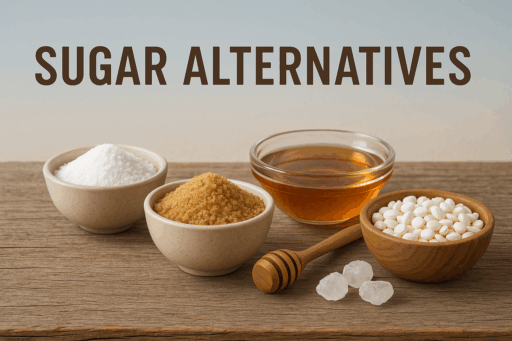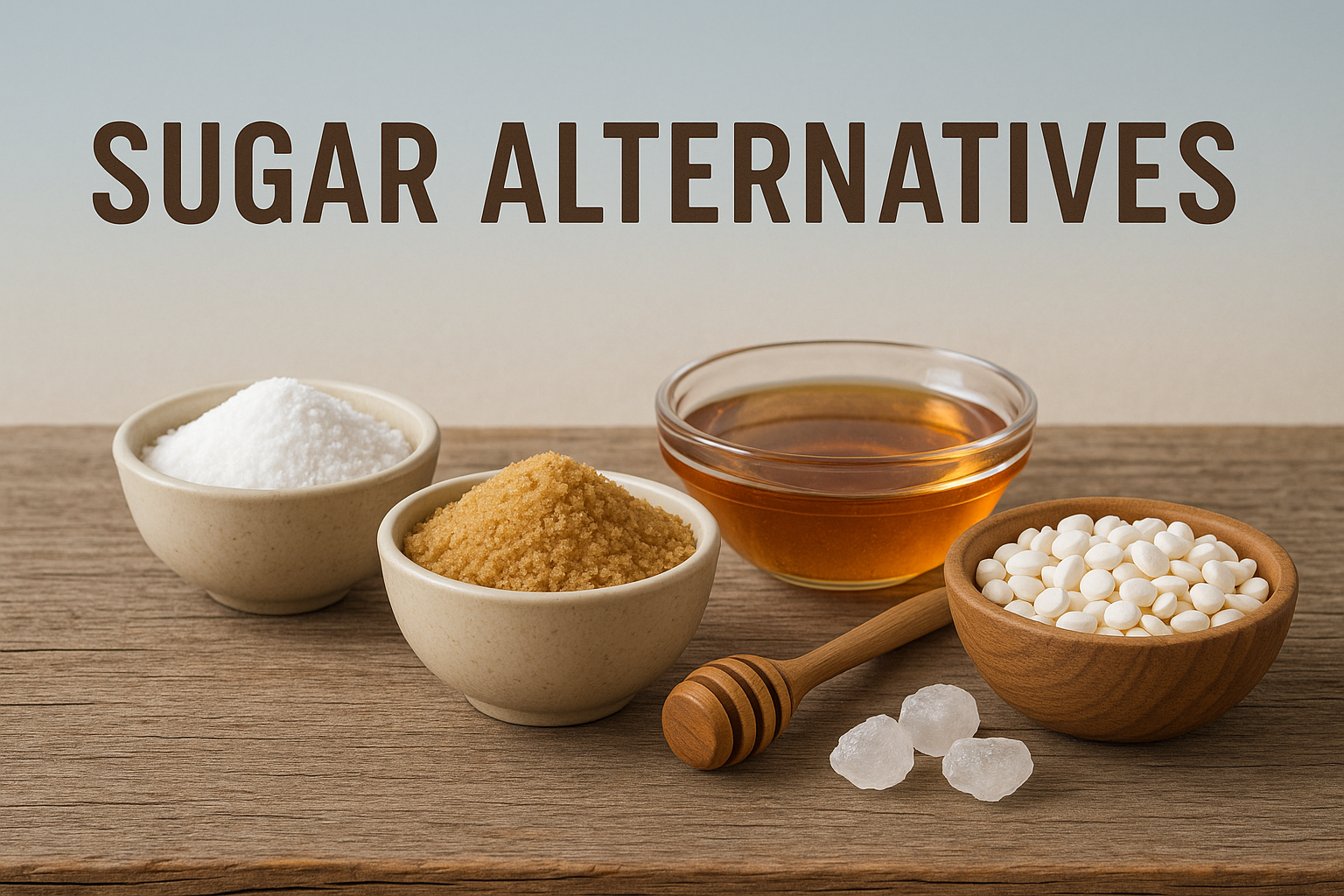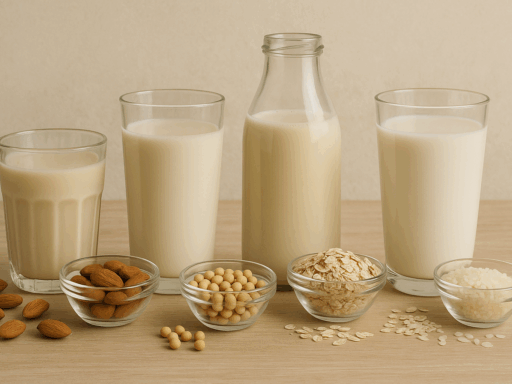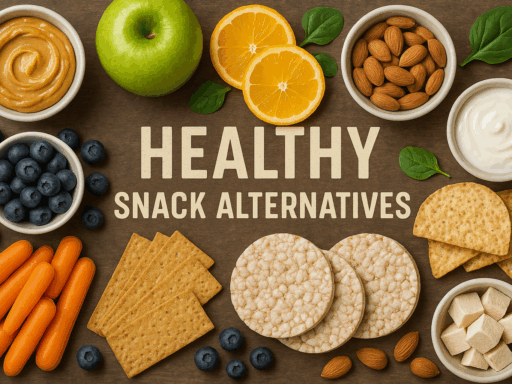Sugar is one of the most commonly used ingredients in the modern diet, but its excessive consumption is linked to numerous health issues such as obesity, diabetes, and heart disease. As people become more health-conscious and aware of the negative effects of refined sugar, many are turning to healthy sugar alternatives to enjoy sweetness without the harmful consequences. These alternatives not only provide a sweet flavor but often come with added health benefits like lower glycemic index, fewer calories, and improved metabolic function.
In this article, we’ll explore some of the best healthy sugar alternatives, including natural sweeteners, low-calorie options, and those with additional health benefits. We will discuss their health benefits, applications, sustainability, and challenges in using them as sugar substitutes in everyday cooking and baking.
Why Consider Healthy Sugar Alternatives?
Excessive consumption of sugar, particularly refined sugar, can lead to a range of health problems, including:
- Weight gain: Sugar is high in calories with little nutritional value, contributing to weight gain when consumed in excess.
- Increased risk of chronic diseases: High sugar intake is associated with an increased risk of type 2 diabetes, heart disease, and fatty liver disease.
- Blood sugar spikes: Traditional sugar causes rapid spikes in blood glucose levels, which can lead to insulin resistance over time.
- Tooth decay: Sugar feeds harmful bacteria in the mouth, leading to cavities and dental issues.
Healthy sugar alternatives offer a way to enjoy sweetness without the associated health risks. These alternatives tend to be lower in calories, have a lower glycemic index, and may provide added nutrients like antioxidants and fiber. By incorporating these alternatives into your diet, you can reduce your sugar intake while still satisfying your sweet cravings.
Best Sugar Alternatives and Their Benefits

1. Stevia
Stevia is a plant-based, natural sweetener derived from the leaves of the Stevia rebaudiana plant. It is hundreds of times sweeter than sugar but contains zero calories, making it a popular choice for those looking to cut calories and sugar intake.
- Applications: Stevia is commonly used in beverages like tea, coffee, and smoothies. It can also be used in baking and cooking, although it doesn’t caramelize like sugar, so it may not work for all recipes.
- Benefits: Stevia is calorie-free and does not cause blood sugar spikes, making it an excellent option for those with diabetes or those trying to lose weight. It may also have antioxidant and anti-inflammatory properties.
- Sustainability: Stevia is considered environmentally friendly because it is grown with minimal water and requires little processing. It is also a renewable crop, which makes it a sustainable alternative to sugar.
- Challenges: Stevia can have a bitter aftertaste, particularly when used in larger quantities. Some people may also experience digestive discomfort when consuming stevia-based products.

2. Monk Fruit
Monk fruit is a small, green fruit native to Southeast Asia. It is used to make monk fruit extract, which is hundreds of times sweeter than sugar. It contains no calories and is a great alternative for those looking to reduce their sugar intake.
- Applications: Monk fruit sweetener can be used in a variety of dishes, including baked goods, beverages, and sauces.
- Benefits: Monk fruit extract has zero calories and doesn’t raise blood sugar levels, making it suitable for diabetics. It also contains antioxidants known as mogrosides, which may help reduce inflammation and support heart health.
- Sustainability: Monk fruit is grown in small amounts in certain parts of Asia, and while farming practices are relatively low impact, the processing methods for monk fruit extract can be resource-intensive.
- Challenges: Monk fruit is often blended with other sweeteners like erythritol to balance its sweetness, which can alter its flavor. It may also be more expensive than other sugar alternatives.

3. Erythritol
Erythritol is a sugar alcohol naturally found in fruits like grapes and pears. It is a low-calorie sweetener that provides the sweetness of sugar but with fewer calories—about 0.24 calories per gram compared to sugar’s 4 calories per gram.
- Applications: Erythritol is commonly used in baking, cooking, and as a sweetener for beverages like tea and coffee. It also works well in frostings, candies, and sugar-free chocolate.
- Benefits: Erythritol does not cause a spike in blood sugar, making it a great option for diabetics. It is also easier on the digestive system compared to other sugar alcohols.
- Sustainability: Erythritol is produced from natural sources like corn, though it requires industrial processing. Its carbon footprint is lower than traditional sugar but may still involve significant energy use during production.
- Challenges: In large amounts, erythritol can cause digestive issues like bloating or gas, although it is generally well tolerated in smaller quantities.
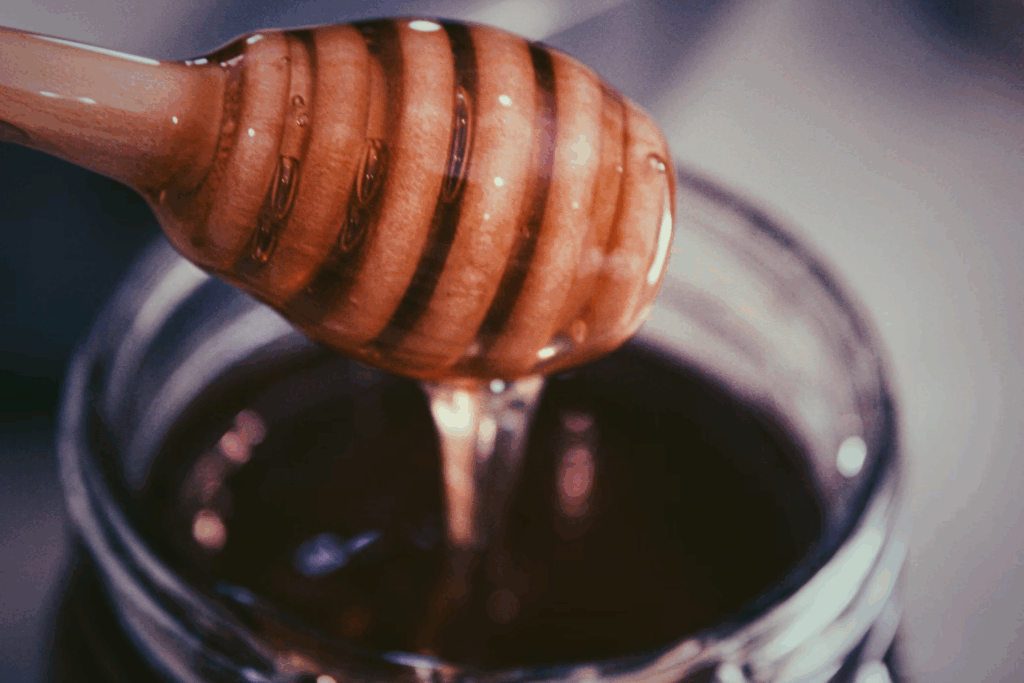
4. Honey
Honey is a natural sweetener produced by bees from flower nectar. It’s a more natural alternative to refined sugar and is often used in cooking, baking, and beverages.
- Applications: Honey is commonly used as a sweetener in tea, coffee, salad dressings, and baked goods. It also pairs well with yogurt, oatmeal, and smoothies.
- Benefits: Honey contains small amounts of vitamins, minerals, and antioxidants, particularly raw, unfiltered honey. It also has antibacterial and anti-inflammatory properties.
- Sustainability: Honey is produced by bees, and beekeeping has a relatively low environmental impact when done sustainably. However, large-scale commercial honey production can be harmful to bee populations.
- Challenges: Honey is high in calories and has a moderate glycemic index, so it should be used in moderation. It is also not suitable for vegans.

5. Agave Syrup
Agave syrup (also known as agave nectar) is a liquid sweetener derived from the sap of the agave plant.
- Applications: Agave syrup can be used as a sweetener in beverages, baked goods, and salad dressings.
- Benefits: Agave has a low glycemic index, making it a good option for people with diabetes or those looking to stabilize their blood sugar levels. It is also sweeter than sugar, so less is needed in recipes.
- Sustainability: Agave is a drought-resistant plant, which makes it a more water-efficient crop than sugar cane.
- Challenges: Agave syrup is high in fructose, which can contribute to insulin resistance and metabolic issues when consumed in excess. It may also be highly processed depending on the brand.
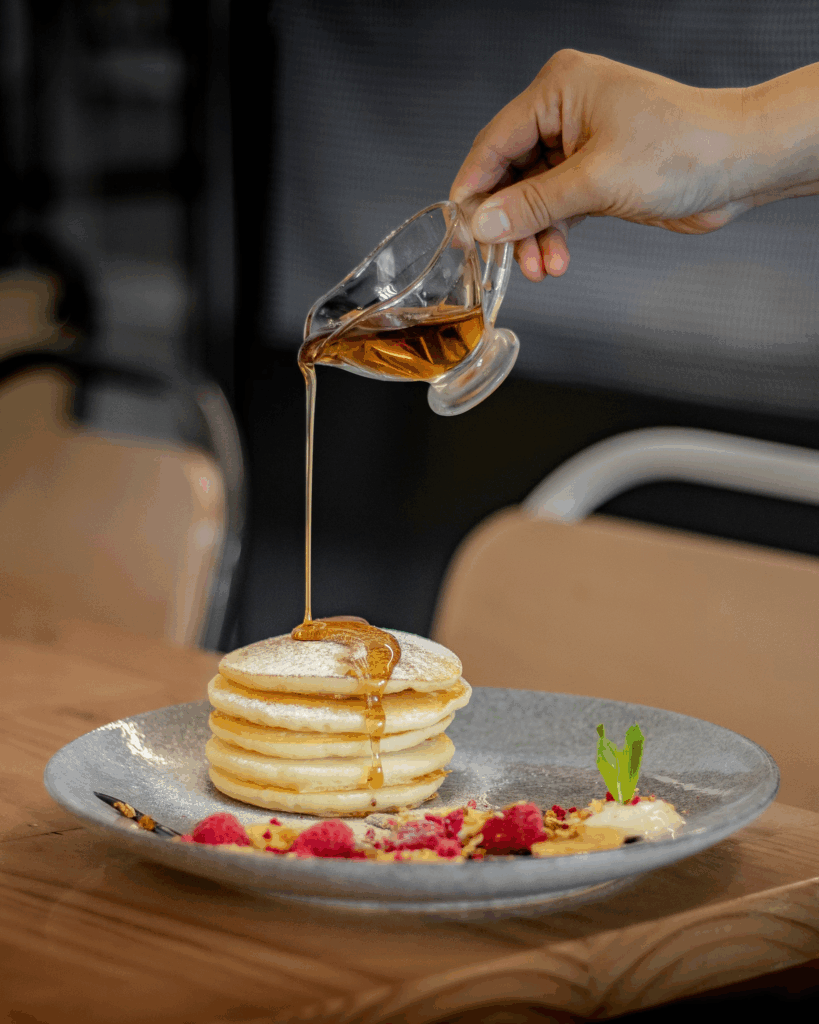
6. Maple Syrup
Maple syrup is a natural sweetener made from the sap of sugar maple trees. It’s often used as a topping for pancakes, waffles, and oatmeal.
- Applications: Maple syrup is used in desserts, breakfast dishes, and beverages. It’s also an excellent addition to marinades and salad dressings.
- Benefits: Maple syrup is rich in antioxidants, particularly polyphenols, which help reduce inflammation and support heart health. It also contains some essential minerals, including manganese, zinc, and calcium.
- Sustainability: Maple syrup production is relatively eco-friendly, as it requires minimal energy for processing, and the trees used for sap production can live for many decades.
- Challenges: Maple syrup is high in sugar and calories, so it should be used in moderation.
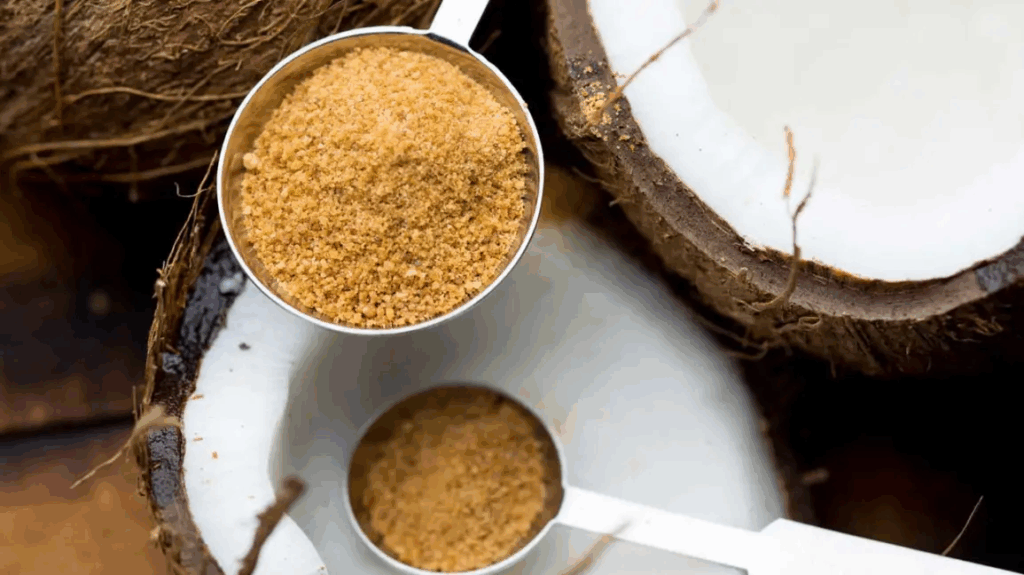
7. Coconut Sugar
Coconut sugar is made from the sap of the coconut palm tree. It is less processed than refined sugar and retains some nutrients from the coconut sap.
- Applications: Coconut sugar can be used in baking, cooking, and as a sweetener for beverages like coffee and tea.
- Benefits: It has a lower glycemic index than regular sugar, which means it doesn’t cause the rapid blood sugar spikes associated with refined sugar. It also contains trace amounts of vitamins and minerals, such as iron, zinc, and potassium.
- Sustainability: Coconut sugar is considered a more sustainable option than traditional sugar because coconut palms require less water to grow than sugar cane.
- Challenges: Coconut sugar is still high in calories and should be used in moderation.

8. Yacon Syrup
Yacon syrup is a natural sweetener made from the root of the yacon plant, native to the Andes mountains.
- Applications: Yacon syrup is used in baking, smoothies, and as a topping for yogurt or oatmeal.
- Benefits: Yacon syrup is low in calories and has a low glycemic index. It also contains fructooligosaccharides (FOS), which are prebiotics that promote gut health.
- Sustainability: The yacon plant is hardy and grows with minimal water in high-altitude areas, further reducing environmental impact.
- Challenges: It can be expensive and may have a slightly earthy taste that doesn’t work in all recipes.
Sustainability of Healthy Sugar Alternatives
The healthy sugar alternatives listed here are generally more sustainable than traditional refined sugar. For instance:
- Stevia and monk fruit are plants that require minimal water and are grown in less resource-intensive environments.
- Maple syrup production is relatively low in energy consumption, and coconut sugar uses less water than sugar cane.
- Yacon syrup is made from a plant that grows with minimal water in high-altitude areas, further reducing environmental impact.
These alternatives help promote more sustainable food systems and are healthier for both the body and the planet.
Challenges in Adopting Healthy Sugar Alternatives
While healthy sugar alternatives offer numerous benefits, there are some challenges:
- Taste Preferences: Some people may not like the aftertaste of sweeteners like stevia or monk fruit.
- Cost: Many of these alternatives, especially natural ones like maple syrup or yacon syrup, can be more expensive than traditional sugar.
- Processing: While some sugar alternatives are more natural, others (like erythritol or monk fruit) may be highly processed, which can affect their overall health benefits.
Switching to healthy sugar alternatives is a great way to reduce your sugar intake while still enjoying sweet flavors. Whether you’re using stevia, monk fruit, or maple syrup, these alternatives provide unique health benefits such as lower calories, a lower glycemic index, and added nutrients. With a variety of options available, it’s easier than ever to find a natural sweetener that fits your needs, helping you lead a healthier and more sustainable lifestyle.
Keywords Integrated:
healthy sugar alternatives, sugar substitutes, natural sweeteners, low-calorie sweeteners, stevia, monk fruit, maple syrup, coconut sugar, yacon syrup.

